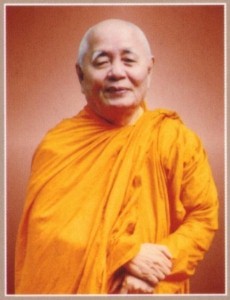Biography
Most Ven. Maha Thera Thích Minh
Châu was born Đinh Văn Nam on Oct. 20, 1918 (the Lunar Year of the Horse) at
Kim Thành Village (Quảng Nam Povince).
His ancestors came from Kim Khê Village, Nghi Long Borough, Nghi Lộc
District, Nghệ An Province. His father
was Đinh Văn Chấp, and his mother was Lê Thị Đạt. The family was large with eleven children among whom Đinh Văn Nam
was the fourth. His father got his
doctoral degree at the age of 21 (in 1913, the Lunar Year of the Ox, under King
Duy Tân). Influenced by the family’s
educational and academic tradition from early childhood, he was an avid and
hard-working learner whose wisdom developed beyond his age.
In 1939 he completed the Indochina Certificate. In 1940 he earned his High School Diploma at Khải Định High School- Huế (Quốc Học High
School nowadays). Soon he was offered
the position as Secretary of the Khâm sứ (the Municipal Government Administration). After one year, having witnessed so much injustice,
and discontented with his job, he resigned.
Studying Buddhism
In 1932 the An Nam Buddhist Studies
Association (Hội An Nam Phật học) came into existence. With it came the blooming Buddhist
Reformation Movement in the Central (of Vietnam, An Nam at the time). Dr. Tâm Minh Lê Đình Thám, an intellectual
patriot and also a Buddhist, was elected President of the Association, and
Editor of the Viên Âm Buddhist Journal.
The Buddhist Studies Movement which he organized attracted many
contemporary intellectual patriots such as Ngô Điền, Phạm Hữu Bình, Võ Đình Cường….
Together with his younger brother Đinh Văn Vinh, Đinh
Văn Nam started to participate in the movement since 1936, and was selected as
Chief Secretary of the Association.
From then on he became one of the key figures in the patriotic movements
against the French colonialism, and those that mobilized the Vietnamese youth to study Buddhism. In those years he often held a leading
role in the development of Buddhist Studies Movements in 17 provinces in
Central An Nam. He was one of the founders of the Union of Buddhist Ethics
Studies (Đoàn Phật học Đức dục), and the Family of Buddhist Reformers (Gia đình
Phật hóa phổ), the former name of the Family of Vietnam Buddhists. In the Buddhist Reformation Movement from Huế to other Central provinces, from the beginning, he already had major contributions, such as mobilizing Buddhists to do charitable works and to support the Báo Quốc Buddhist School and Kim Sơn Monastery, especially during the famine under the occupation of Japanese fascists. He assisted to relocate monks to the South and other places where the living and practicing conditions were better.
(To be continued)
Source:
http://www.nguoiaolam.net/2012/09/hoa-thuong-thich-minh-chau-tieu-su-cong.html#.UEomRpHZKCk
